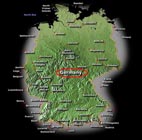A Berlin cemetery unites the world
 Berlin - Berlin has seen its fair share of blood and tears, a fact borne out by its more than 190 cemeteries, some dating back to the 17th century.
Berlin - Berlin has seen its fair share of blood and tears, a fact borne out by its more than 190 cemeteries, some dating back to the 17th century.
But the large number of final resting places is more to do with Germany's more recent history, according to local historian Hellmuth Pohren-Hartmann.
One that stands out is the British War Cemetery near the tree-shrouded Havel river, not for from the city's Olympic Stadium.
Here are the graves of close on 4,000 men and women from Britain's now perished Empire, who died in Berlin during World War II.
Rows of unpretentious white Portland Stone headstones list the names and dates when the servicemen fell, many of them from traditional British regiments, some now disbanded.
Names like the Black Watch, the Argyll and Sutherland Highlanders, The Green Howards, the Royal Northumberland Fusiliers, the 106th Lancashire Hussars confront visitors.
Mostly the graves contain the remains of Royal Air Force crew members whose planes were shot down during war-time raids; others, bear the names of Canadians, Australians, New Zealanders, Indians and South Africans killed fighting the Nazis.
The War Cemetery also contains the graves of prisoners-of-war who perished on "death marches" into Germany from camps in Poland, as Russian forces advanced on Berlin near war's end.
In addition, 397 of the burial plots are listed as "unidentified," the headstones reading simply, "person unknown."
The British War Graves Commission is responsible for the cemetery, with its neatly trimmed grass and row upon row of graves and occasional green spaces studded by lofty, broad-based trees.
Two workmen in dungarees attend to a time-worn tombstone. "Visitors from many parts of the world come here every year," says one of them.
"Many of the servicemen buried here were y younger than 21 when they died," sighs one of the gardeners. Two or three of the headstones are inscribed with the Star of David symbol, indicating the person's Jewish faith.
The British War Cemetery was created after the war ended in 1945 - when Berlin was "occupied" by the four war-time allies - US, Britain, France and the then Soviet Union.
On a bitterly cold March day the sun suddenly bursts through clouds, bathing the cemetery in a piercing ray of light. A couple from Manchester, England, tramp towards the memorial site along a wooded path from the main road.
"We've been here twice," says a woman, heavily muffled up in a dark-green coat. Asked about their latest visit, her husband explains: "An uncle of mine died in a raid over Berlin in the early part of the war.
Elsewhere, the remains of RAF Flight Engineer John Bremner were buried late last year with full military honours. He was a crew member in a Halifax bomber downed by a German Messerschmitt over Berlin on January 20, 1944.
Of the Halifax's crew of eight, four managed to bail out, spending the rest of the war in German prisoner of war camps, and four perished, Bremner among them.
For 64 years his body was never traced, then experts working at a woodland site where the bomber crashed in south-east Berlin finally identified his remains by DNA analysis in 2008.
Reg Wilson was the Halifax's navigator at the time. Now in his late 80s he returned to Berlin to attend the special military funeral ceremony for Bremner last October.
Wilson described the final moments of the Halifax in the following terms: "The aircraft was shot down shortly after we dropped our bombs from a height of 18,000 feet (5,485 metres) above the the Berlin city centre."
"Then suddenly, a German fighter pilot flew beneath us firing cannon upward into our starboard wing fuel tanks, causing the Halifax to go into a spiral dive. Then there was an explosion," he said.
Entry to the British War Cemetery is made through a limestone gateway formed by three archways. A guest book kept there is crammed with peoples' names and comments after visits
A visitor from Sydney on seeing the grave of an Australian air force pilot, writes numbly, "So far from home." Other comments read, "very moving," "rest in peace" and "breathtaking."
Often War Cemetery visitors are German. One Berlin visitor, after spending a recent afternoon touring the cemetery, writes just three words: "No more war!" (dpa)